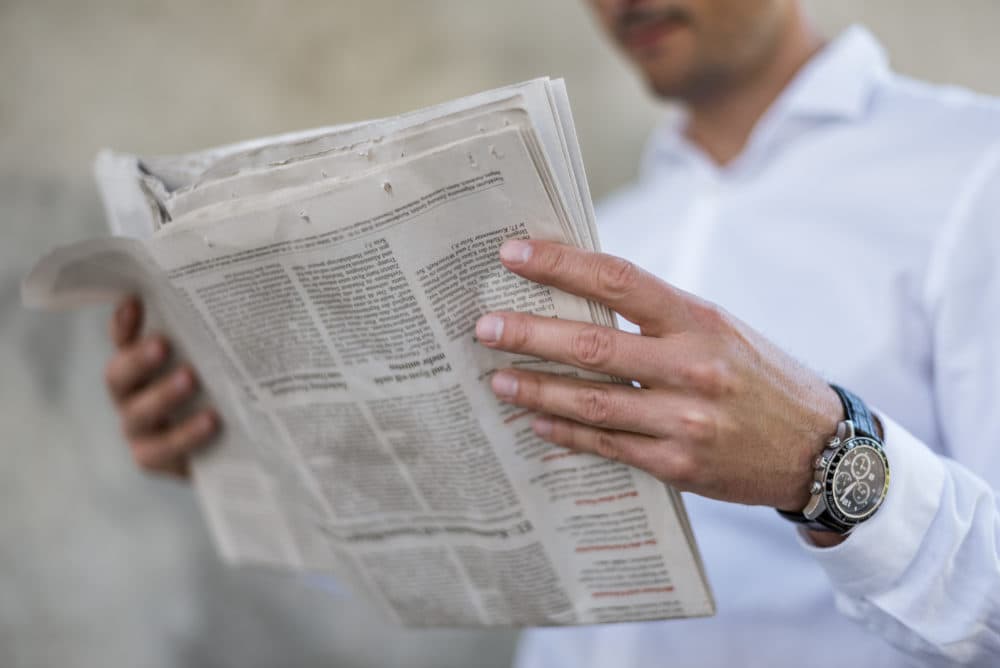Advertisement
Newspaper giant Gannett ends print runs for many local weeklies in Mass.

More than two dozen local newspapers are about to disappear from the driveways and porches of homes across eastern Massachusetts. Some will be replaced by a regional substitute, but most will go digital-only.
Last week, the newspaper chain Gannett announced on each papers' websites that it will stop printing at least 19 weeklies by the first week of May. The announcements said coverage would continue online. (A full list of affected papers and communities is below).
Gannett also announced it will merge nine weeklies on May 12. For these papers, print operations will continue.
Speaking with Radio Boston's Tiziana Dearing, Dan Kennedy, journalism professor at Northeastern University and media expert who blogs his industry insights at Media Nation, said the move will further hollow out community journalism.
Here are some highlights of the conversation:
On these print weeklies as "zombie papers":
"Another term that often gets used is "ghost newspapers." And the idea is that many of these papers were already printing very, very little in the way of local news. What they would tend to do is print stories from other parts of the network [they belonged to].
"The flagship of Gannett is USA Today, and you'd see all these bylines that say "USA Today Network." And you might be flipping through your local paper and seeing stories from 10, 20 or 30 miles away that are of no relevance to you whatsoever."
On how going digital-only will affect coverage in these communities:
"I should say that this announcement comes just several weeks after Gannett told the reporters at its Massachusetts weekly newspapers that almost all of them would be reassigned away from their local beats and onto regional beat so that all of their work could run in more than one paper. As a result, you wouldn't have that hyperlocal coverage.
"In addition to that, the rhetoric that you see coming out of Gannett is that they are going to be just as committed to covering local news on their digital platforms as they were in print. Well, that's not very reassuring, given how little news was in these newspapers.
"I am far from somebody who's nostalgic about print. But they already were doing very little and I don't think we're going to see much on their websites either."
On how coverage will look in the future:
"With these papers, we're looking at 25 or 30 years of one round of cuts after another, in many cases preceding Gannett's ownership by many years. So the idea that the cutting is now going to stop or that it might even reverse itself and they begin to grow again, whether it's in print or online, that's a wonderful thought but it's really not borne out by experience."
On national politics affecting understanding of local issues:
"I believe that strong community journalism can be a way of overcoming the horrendous polarization that we're experiencing in the country right now.
"You know, the old cliche is that there isn't a liberal and a conservative way to pick up the trash. Everybody wants effective trash pick up. Everybody wants good school systems. Everybody wants a strong police department that nevertheless respects the rights of citizens. Those are issues that ought to bring us together.
"Of course, as we are increasingly seeing, issues of schools and police are becoming caught up in that polarization and to the extent that we have less and less reliable local news, the fear is that that polarization will only increase."
On the future of local journalism:
"The glimmer of hope is really in these independent projects. I recently put together a spreadsheet of every independent local news project in Massachusetts I could find, and I was really stunned to see that something like 200 communities in Massachusetts have something — and I'm not even counting the big media outlets like The Boston Globe or WBUR or GBH News. I'm just really looking at the hyperlocal projects.
"Some of them are better than others... But I think it's heartening that there were all these projects out there, at least trying to tell the story of their communities in an independent way without being caught up in the downward spiral of corporate chain journalism."
Here is a list of the affected newspapers and communities:
These papers will cease printing and go digital only:
- The Beacon - Acton, Boxborough
- Billerica Minuteman - Billerica
- Needham Times - Needham
- Brookline Tab - Brookline
- Burlington Union - Burlington
- Eagle Independent - Littleton, Chelmsford, Westford
- Bedford Minuteman - Bedford
- Kingston Reporter - Kingston
- Country Gazette - Plainville, Millis, Foxborough, Wrentham, Franklin, Medway, Norfolk, Bellingham
- Transcript & Bulletin - Norwood, Dedham, Westwood
- Wayland Town Crier - Wayland
- Weston Town Crier - Weston
- Sudbury Town Crier - Sudbury
- Carver Reporter - Carver
- Journal News Independent - Bridgewater, Raynham, Mansfield, Easton
- Beacon Villager - Maynard, Stow
- Waltham News Tribune - Waltham
- Newton Tab - Newton
- Watertown Tab - Watertown
- Times Advocate - Sharon, Walpole
These papers will merge:
- Scituate Mariner, Cohasset Mariner and Marshfield Mariner will become The Coastal Mariner
- Arlington Advocate and The Winchester Star will become The Advocate & Star
- Saugus Advertiser and Melrose Free Press Observer will become The Free Press & Advertiser
- Medford Transcript and Somerville Journal will become The Transcript & Journal


